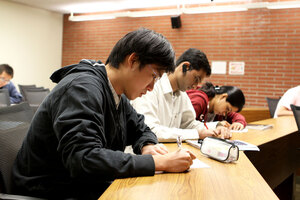Student evaluations used in professors’ performance reviews
Before they start filling in scantron sheets for their final exams, students in departments across the university will have to fill in slightly different forms — teacher evaluations.
Those evaluations, though often viewed by students as either a pain or a chance to vent frustrations, are taken seriously by the university — student reviews can directly affect an instructor’s salary, job security and promotion opportunities.

Evaluating · Yinghua Zhu, a second-year graduate student studying electrical engineering, fills out an evaluation of his professor. Evaluations are used in performance reviews. - Amaresh Sundaram Kuppuswamy | Daily Trojan
“Students have the capacity to give an unbiased review of faculty performance,” said Michael Quick, executive vice dean of academic affairs for the College of Letters, Arts & Sciences. “They’re in a position to give an unbiased strengths and weaknesses review.”
At the end of every semester, students are asked to review their professors. Those reviews are then passed on to the instructor usually six to eight weeks after the end of the semester.
Those reviews are also used by administrators during the annual merit performance and tenure reviews for faculty.
John O’Brien, senior associate dean of academic affairs in the Viterbi School of Engineering, said student evaluations are the “biggest single piece” of the review process.
The decision to offer tenure is based on teaching and research, as well as service to the university, Quick said. Typically, professors must split their efforts into 40 percent teaching, 40 research and about 20 percent service.
For professors who have already earned tenure, student evaluations affect the teaching aspect of their review, O’Brien said.
“In terms of evaluating people in the classes, we don’t say, ‘They’re tenured, so why even look?’” Quick said.
Instructors who are non-tenure track may receive a job promotion as a result of a positive annual report, said O’Brien, though they will never acquire a tenure position as a result of student evaluations.
Quick noted, however, that evaluations are not the only factor that determines an instructor’s fate, and administrators recognize that students’ reviews can sometimes be biased.
“Oftentimes, you have to be careful because evaluations can be based on things other than performance,” he said. “If a faculty member was really hard on me and I got a ‘C,’ they got a poorer evaluation from me than if I got an ‘A.’”
Because the student evaluations carry a significant amount of weight, Quick said students should think through their comments before filling out the forms.
“We wish students would take more time to fill these things out because it helps us out, and we really do value the comments,” Quick said.
Beyond tenure and performance reviews, student evaluations can help or hurt professors in other ways.
Nicholas Warner, a professor of physics, math and astronomy in the College, said teachers in his department receive a pay raise based on positive evaluations.
“There is a financial consequence to your evaluation,” he said. “Even though it’s small every year, over time it builds up hugely.”
As an indirect benefit, Warner said he uses his students’ comments to gauge how he should run his class the next semester.
“If there’s a number of people who make the same comment, I adjust the class according to it,” he said.
Jieying Zhang, an assistant professor for accounting in the Marshall School of Business, said she takes her students’ comments to provide a better learning experience for her students in the upcoming semesters.
“Every year I try to incorporate more examples and practice in class. The comments do help,” she said.
But some faculty members said they do not receive any direct benefits from a positive student evaluation.
“I think it helps me in that I always rate high with the students,” said John Cyrus Smith, an adjunct lecturer in the Annenberg School for Communication & Journalism. “It helps my reputation with Annenberg. It doesn’t affect salary. It certainly never affected mine.”
Liana Stepanyan, a lecturer in the Spanish and Portuguese department in the College, said her students’ evaluations regarding her performance affect neither her salary nor her likelihood of promotion.
“The only influence in the past 10 years was the summer classes,” she said. “Summer classes were assigned based on the student evaluations. The higher you rank the more likely you are to get a class.”
Still, students said they appreciated that their feedback could have an impact.
Joe Rothenberg, a sophomore majoring in animation, said he appreciates the opportunity to give his professors feedback.
“I’m glad that the teachers have incentive to perform well,” he said.
